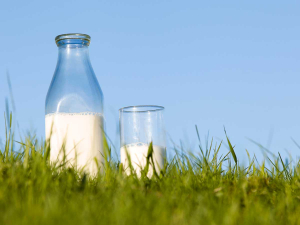Another Windfall for Fonterra Farmers, Unit Holders
Fonterra farmer shareholders and unit holders are in line for another payment in April.
 Fonterra and New Zealand’s Agricultural Greenhouse Gas Research Centre are part of an international group that includes Nestle, Danone, Arla Foods and FrieslandCampina.
Fonterra and New Zealand’s Agricultural Greenhouse Gas Research Centre are part of an international group that includes Nestle, Danone, Arla Foods and FrieslandCampina.
Dairy's superpowers are lifting their game on proving greenhouse gas credentials.
Mitigation Actions in Life Cycle Assessment (MiLCA) is a protocol that gives dairy companies and consumers confidence that claims for GHG emissions stack up.
Fonterra and New Zealand's Agricultural Greenhouse Gas Research Centre are part of an international group that includes Nestle, Danone, Arla Foods, and FrieslandCampina.
MiLCA is credible and is far from a back-of-the-envelope calculation, greenhouse gas scientist Aaron Simmons told the International Dairy Federation conference in Paris recently.
"We haven't made this up at a backyard barbecue while we've been drinking a few beers. What MiLCA ultimately does is demonstrate that we're taking action on climate change," Simmons says.
Simmons, a senior scientist with the NSW Department of Primary Industries, specialises in estimating GHG reductions.
There were lots of claims out there for carbon sequestration products, he said.
"Do consumers trust that? I don't trust the majority of them and that's my area of expertise."
The first step to building trust in various products was to build a body of scientific evidence to independently test claims.
The idea was to build trust in the consumer.
By being "robust and defensible", the industry could create a positive, credible narrative.
"So, rather than someone coming in an putting in the boot to the dairy sector, it allows the sector to stand up and say 'hey, we're doing the right thing'."
MiLCA could show that technologies for reducing GHGs were safe as well as effective, like proving that the dairy industry wasn't doing harm in some other area by reducing emissions.
"There's a whole heap of indicators that we could be creating problems with so there needs to be a Life Cycle Assessment that shows 'we're going to reduce greenhouse gas emissions - and relative to what we're doing now, we're not going to screw up much else'."
The impact of the farming system also needed scrutiny, in areas like animal health and product quality.
There are currently two frameworks for calculating and reporting GHG emissions. First, a greenhouse gas inventory, likely used for a country or a dairy business.
An inventrory can help identify the greatest single source of emissions. At an international scale, that information is usually passed on to the United Nations Climate Change Conference - forming a global picture of how well the planet is doing on reducing emissions.
The other framework addresses claims about reducing GHGs. It's important for people to understand that the two frameworks use completely different methodologies.
In Australia, for instance, carbon credits that are generated through soil-carbon sequestration don't show up in the country's national inventory when it reports to the UN.
Basically, it was a "horses for courses" approach, Simmons said.
Tim Fulton travelled to Paris with support from the New Zealand Guild of Agricultural Journalists and Communicators.
Horticulture New Zealand (HortNZ) has added its perspective to numerous primary sector voices urging the Government to strengthen its draft legislation to replace the Resource Management Act (RMA).
The Commerce Commission has finalised new information disclosure requirements for local councils and water organisations that deliver water supply and wastewater services.
Beef + Lamb NZ (B+LNZ) is calling for significant changes to the Government’s reforms to the Resource Management Act (RMA).
NZPork says the Government needs to strengthen its proposed planning laws to ensure New Zealand's pig farmers can continue to produce pork.
Good news for kiwifruit growers - a record crop with forecast per hectare returns at record levels for all fruit categories for the 2025-26 season.
As guests gathered on what is known as the Speaker's Lawn - a beautifully manicured patch of grass behind the main buildings of Parliament - to mingle and enjoy a lamb chop to celebrate National Lamb Day, the mood was very much upbeat.
OPINION: Staying with politics, with less than nine months to go before the general elections, there’s confusion in the Labour…
OPINION: Winston Peters' tirade against the free trade deal stitched with India may not be all political posturing by the…